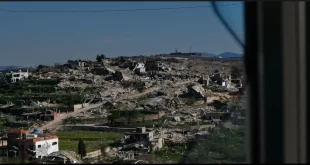Jan 2, 2016, Finian Cunningham, Strategic Culture
The year ended, appropriately, with Turkish president Recep Tayyip Erdogan flying to Riyadh to hold a summit with Saudi King Salman. The meeting had the air of two leaders closing ranks after a year of setbacks. As the old adage puts it, misery needs company. And there is much misery that the Turkish and Saudi leadership have to console each other about.
Both Ankara and Riyadh have seen their military schemes in the region turn decidedly sour. Russia’s military intervention in Syria over the past three months has helped to stabilize the government of President Bashar al-Assad, which was targeted covertly by Turkey and Saudi Arabia for regime change. Washington and other NATO powers were to be sure part of the criminal plot. But it was Turkey and Saudi Arabia that served as the «point men».
Devastating losses inflicted by Russia against jihadist mercenaries have turned the tide on the dirty war co-sponsored by Ankara and Riyadh, with even the United States recently admitting that Russian President Vladimir Putin has succeeded in his strategic goals of stabilizing the Syrian state and long-time ally of Moscow.
Russia’s aerial bombardment of oil smuggling and weapons routes used by the jihadist proxy army have cut off supply lines that Turkey had enabled the terror brigades with. Estimated to have been earning the mercenaries millions of dollars per day, thanks to the collusion of Erdogan’s regime in Ankara, the decimation of oil contraband by Russian bombing raids has plugged the cash and weapons fuel for the terrorists waging war in Syria.
No wonder then that Erdogan was in Riyadh on December 29-30 to discuss the formation of a new «strategic cooperation council» with the House of Saud. The Turks and Saudis now find themselves with a serious funding problem for their regime-change scheme in Syria.
Saudi foreign minister Adel al-Jubeir, of course, did not mention Syria in public, and he tried his best to sanitize proceedings, saying of the summit: «The meeting produced a desire to set up a high-level strategic cooperation council between the two countries», in order to strengthen military, economic and investment cooperation.
But reading between the lines, the all-important, urgent backdrop for the summit is Syria.
According to Syrian sources, the Turk-Saudi arrangement for regime change in the neighboring state worked as follows. The Turks provided the logistical connections for weapons, jihadist fighters and training camps across the Syrian border, while the House of Saud was the main funding source for the nefarious enterprise going back to the origin of the conflict in March 2011. The Saudis would also provide weapons from their copious US-supplied arsenals, with tacit approval from the American Central Intelligence Agency.
Erdogan’s renewed military campaign against the breakaway Kurdish population in the southeast of his country and in northern Iraq, plus a general downturn in Turkey’s once-bustling economy has meant that Ankara certainly does not have the finances to fund its neo-Ottoman schemes. As already noted, the Russian air assaults along the Turk-Syrian border has put paid to illicit sources of smuggling cash. Thus, cash-strapped Erdogan is in a bind.
So too is Erdogan’s erstwhile financier in Riyadh. The oil-rich kingdom ended the year by posting a record budget deficit put at $98 billion – or 15 per cent of the country’s economy.
The Saudi rulers are now having to embark on a previously unheard-of austerity drive to rectify their awry finances. As the Financial Times headlined: «Saudis unveil radical austerity programme». The Saudi population is facing price hikes in fuel, electricity and water, which is an abrupt departure from the country’s «social contract» whereby the autocratic rulers have up to now always bought off discontent among «the commoners» with lavish subsidies to ease the cost of living.
This has implications for social unrest in the authoritarian kingdom. Despite decades of royal largesse, Saudi Arabia suffers from high levels of chronic unemployment and poverty, particularly among its youth. This reflects the rentier nature of the Saudi economy, typical of the oil-rich Gulf states. As much as one-third of the Saudi total population of 27 million are foreign expatriate workers, many of them from South Asia, providing cheap slave-labor. This has resulted in large sections of the Saudi native population being unemployed, which has been kept docile up to now through «hand-outs» from the Saudi oil coffers.
A major factor in Saudi Arabia’s dwindling state finances is the crash in world market oil prices. Only five years ago, the price of oil was well over $100 per barrel. Today it is down around $40, with a slump of 23 per cent this year alone.
Some 80 per cent of the Saudi state revenues depend on the sale of oil. That compares with Russia’s dependence on oil at around 15 per cent, owing to Russia’s much more industrially diversified economic development.
And here is where the plot thickens. Over-production of oil by the Saudis has contributed to the saturated supply in world markets, which has in turn driven down prices for the commodity.
Russia’s energy minister Alexander Novak was in no doubt who is to blame for the slump in market prices. Novak told Rossiya 24 TV channel this week: «Saudi Arabia has this year increased production by 1.5 million barrels per day, thus effectively destabilizing the situation on the market.»
Some analysts have averred that Saudi Arabia’s seemingly self-defeating policy has been motivated by a bid to defend its market position as the world’s second top oil producer along with Russia by driving out weaker competitors. A more mischievous explanation is that the Saudis were aiding and abetting Washington’s agenda of trying to damage Russia’s economy.
Either way, the upshot would seem to be that the Saudis have ended up doing more damage to their own interests by playing geopolitics with oil.
Adding to Saudi woes is its ongoing war in Yemen. Nine months of non-stop bombardment of its southern neighbor has achieved nothing for the House of Saud in terms of re-installing an ousted puppet-regime. There seems to be no end in sight for that war, which means the Saudis are set to pile up more military expenses in the year ahead, just at a time when the kingdom’s coffers are in arrears.
But as the Machiavellian schemes backfire for both Turkey and Saudi Arabia, there is perhaps a measure of good news for others. As UN-sponsored peace talks get underway over the coming weeks on the Syrian conflict, the setbacks for Ankara and Riyadh will strengthen the hand of Russia and its Syrian ally at the negotiating table.
It’s an ill-wind indeed that blows no-one any good. And at least the whirlwind that the Turks and Saudis are reaping from their own Machiavellian plots might just bring a reprieve for parties who are genuinely interested in seeking peace in the region.
 Syria Support Movement solidarity with the Syrian people
Syria Support Movement solidarity with the Syrian people





